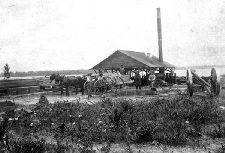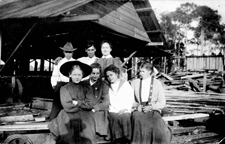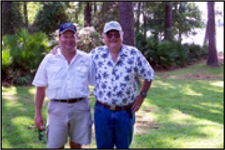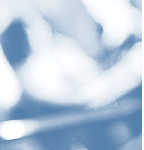 |
|
Bear Lake History
 John Dollins met a man named Mr. Taylor when he was in active duty for the Navy about 1950 or so. He made friends with this man during this time. At some point, they discussed the Lockhart area and Bear Lake. He offered a lot to John on the lake, which is now 3222 Holliday Avenue and John and Mickie bought it in 1952. There were many weekends of boating, skiing, and swimming on the lake before the house was ever built. John Dollins met a man named Mr. Taylor when he was in active duty for the Navy about 1950 or so. He made friends with this man during this time. At some point, they discussed the Lockhart area and Bear Lake. He offered a lot to John on the lake, which is now 3222 Holliday Avenue and John and Mickie bought it in 1952. There were many weekends of boating, skiing, and swimming on the lake before the house was ever built.
The lot was pure white sugar sand with pine trees! John said there were too many weekends that he got stuck in the sand and had to have someone pull him out. Down by the lake was pure black muck. They would jump up and down and watch it squeeze through their toes and they had black feet for weeks! The Taylor's had a two-deck dock that they used to swim to from their lot.
John and Mickie built the home in 1960 and moved from Orlando to the lake. At this time, it was real country. SR 436 was a two-lane road with only Forest Lake Academy built there. He mentioned that he can remember when the original wood-structure academy burned. Apopka was a totally separate town and they never went there! It was too far. They did their shopping at Exum's grocery (Mickie's family store) in Lockhart and picked up milk and bread at Begg's store on Bear Lake Road.
One of the first families on the lake were the Young's. Howard Johns married Yvonne Young. Howard was John Dollins' uncle. The Dollins' used to go to parties and swim at the Young's house.
 Many fishing days were spent on the lake. The speckled perch were plentiful and easy to catch. They had great fish fry's with the big catches. Many fishing days were spent on the lake. The speckled perch were plentiful and easy to catch. They had great fish fry's with the big catches.
When John and Mickey moved to the lake, the Florida Power Clubhouse was already there. It is one of the oldest structures on the lake. Most of the property on the lake was occupied with camps and not with full-time people living on the lake. The lake was so clean then that you could use the lake water for drinking and bathing. It was years before anyone put in wells for water.
John and Mickie grew up in Lockhart, lived in Orlando for years, moved to Bear Lake in 1960. Mickie died in 1996 but John still lives in the original home (with some renovations).
 (Billy Long and his son Billy Long, Jr. pictured below.) Billy Long has lived on Bear Lake for 42 years. He provided the information for this narrative in an interview at his home and on the lake during a boat ride on August 24, 2001. The narrative reflects Billy's in-depth understanding of Bear Lake and its surrounding area. (Billy Long and his son Billy Long, Jr. pictured below.) Billy Long has lived on Bear Lake for 42 years. He provided the information for this narrative in an interview at his home and on the lake during a boat ride on August 24, 2001. The narrative reflects Billy's in-depth understanding of Bear Lake and its surrounding area.
Personal History: Billy and his wife Bobbie moved to Bear Lake in 1959. Bobbie was born and raised on a lake in Orlando, and when she and Billy got engaged, Bobbie insisted that they live near water. The couple always seemed to end up at Bear Lake when they went to look for houses and finally built a house on the lake. After they began having children, the Long's bought another piece of property on Bear Lake in order to build a larger house. They moved to this house in 1970, and continue to reside there. They love living on the lake and, after 42 years, Billy still looks forward to watching the ducks, squirrels, and otters every morning as he eats breakfast.
One of Billy and Bobbie's three children, Bill Jr., was present for the interview and provided a boat ride around the lake. He learned to fish when he was only three and currently runs a fishing tour business, Bill Long's Fishing Guide and Lake Tour Service, and continues to live on Bear Lake. In the interview, Bill Jr. recalled how much he and his siblings enjoyed growing up on the lake: "We all loved growing up on the lake. We'd go skiing, tubing and swimming. Of course, I love to fish. It was fun having the family grow up there." Until 1998, the Long's owned a muck farm on nearby Lake Apopka in Orange County. ("Muck farms" are farms built on marshland that has been drained for the purposes of farming.) Without the responsibility of the farm, Billy and Bobbie now have more time to enjoy Bear Lake.
Bear Lake is a 310-acre lake with a maximum depth of 37 feet. According to Billy, Bear Lake is spring fed, which he sees as an advantage for the lake: "Regardless of how dry it has ever been, which this Spring was probably the driest I ever saw it, that spring never dried up. It was always full. So, therefore, this lake was down maybe like two feet this Spring, but it's back to normal right now. It didn't take long to pop back."
At the time of the interview, Billy said that the water level had almost returned to normal after one of the worst droughts in Florida history. As Billy understands it, the spring also makes the water especially clear. Earlier in the summer he could see 15 feet down into the lake: "You could think you were in the Bahamas, it was so deep." Billy reported that the current visibility is 8' deep. Billy believes that the water quality has also remained relatively high over the years.
In an effort to protect the health of Bear Lake, lake resident Nancy Dunn conducts water clarity readings once a month for the Florida Lakewatch Program. When there was a hydrilla problem approximately 16-17 years ago, the lake's homeowner's association, Bear Lake Preservation Society, put 3,000 grass-eating carp in the lake, which returned the lake to a balanced state. According to Billy, the lake's fish population remains constant: shellcrackers, largemouth bass, speckled perch, catfish, gar, and shiners. Among the other types of wildlife are white heron, great blue heron, wood ducks, a bald eagle, osprey, alligators, otters, possums, and raccoons. Billy especially enjoys watching the wood ducks in his yard and had duck boxes put in for them; one day last spring he counted 40 wood ducks in his backyard.
Although the lake remains fairly healthy, there are a couple of common practices that Billy sees as detrimental to the lake. According to Billy, one of the biggest problems is the use of jet skis, which dump a large amount of raw gas into the lake and also contribute to the recession of lake beaches. Billy's neighbor has lost five feet of his property where waves from the jet-skis have "just washed his yard away." Billy also attributes the lake's loss of lily pads, which he understands are good for the lake, to jet skis. Another issue important to Billy is runoff: "I didn't realize when I first started to live on this lake how important it was not to have runoff, and then farming on Lake Apopka and seeing what runoff did to that lake. It's very, very important."
The Bear Lake Preservation Association tries to address runoff by educating residents about lawn fertilizer at their meetings and through a quarterly newsletter that deals with issues affecting the lake, but residents' compliance is strictly on a voluntary basis. The Long's do not fertilize their grass, but Billy estimates that approximately half of lakefront residents continue to fertilize their yards. As he understands it, when a lawn is fertilized, about half of the fertilizer immediately washes into the lake; this raises the phosphorous content, which can result in algae blooms.
History/Information: When the Long's moved to Bear Lake in 1959, the lake was about 50 percent developed. The lake is now fully developed, with approximately 180 houses on the lake. According to Billy, a developer named Sam Sneed was going to build a golf course on the lake in the 1960s. A canal was dug to create building lots -- and remains today -- but the construction of the golf course fell through. Residential development has brought a number of problems for Bear Lake. Billy is especially concerned about runoff from Bell Aire, a nearby subdivision that was built before the instatement of regulations requiring retention ponds. While newer subdivisions are required to build retention areas to catch runoff, water from the streets of Bell Aire runs directly into the lake.
In terms of the surrounding area, according to Billy, commercial development began about 25 years ago. Although the area is fairly close to Orlando, much of the land remains undeveloped. After a freeze in 1981, many orange groves in the area were depleted and never recovered. The land then became predominantly cow pastures and pine trees. According to Billy, farmers planted pine trees in frozen out groves so that they could continue to receive agricultural tax exemptions.
Development: An additional issue that was affecting a number of Bear Lake residents is that of riparian rights. Billy described the "controversy" as follows: "Years ago when we bought the property, we got the riparian rights, which means we bought the land out into the middle of the lake where it joins another landowner. It's really kind of crazy because some of the homes have it and some don't. The ones that don't have it, a couple of attorneys from Melbourne or somewhere came over and bought those. Nobody is allowed to build a dock if they don't have the riparian rights because you're building on their property. I really believe it will fall through. I don't think the state will uphold that. That's a controversy that's going on." The owners of the riparian rights could then charge large fees to homeowners who want to build docks and boathouses.
Since the interview, the state has determined that the attorneys do not own the riparian rights, and residents can build docks and boathouses on the property. Billy seems relatively optimistic about the future of Bear Lake. While residential development has brought more water pollution, the lake remains fairly healthy, particularly in comparison to others in the area. The water is clear and the fish population is stable. Although residents cannot eliminate the runoff from subdivisions like Bell Aire, the Bear Lake Preservation Association works to educate lake residents about what they can do to decrease fertilizer runoff from their own yards. Many residents, including Billy, have stopped fertilizing their lawns entirely. Through the BLPA newsletter, the Association also educates residents about other important issues affecting the lake and what residents can do to help. For instance, the newsletter has encouraged residents to have their septic tanks pumped out every two or three years and to blow grass clippings from their driveways and streets into their lawns so that the clippings will not wash into the lake. Concerned residents are key to maintaining the health of Bear Lake. Written By: Ashley Spalding |
|
|
|
|
|
|
|
|







